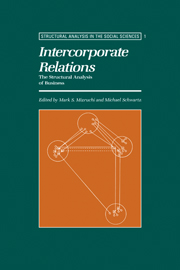Book contents
- Frontmatter
- Contents
- List of figures
- List of tables
- Introduction
- I Theoretical perspectives
- 1 A resource dependence perspective on intercorporate relations
- 2 Finance capital and the internal structure of the capitalist class in the United States
- 3 A structural approach to markets
- 4 What is money? A social structural interpretation
- 5 Corporation, class, and city system
- II National and international business structures: a comparative perspective
- Index of authors
- Subject index
4 - What is money? A social structural interpretation
Published online by Cambridge University Press: 04 February 2010
- Frontmatter
- Contents
- List of figures
- List of tables
- Introduction
- I Theoretical perspectives
- 1 A resource dependence perspective on intercorporate relations
- 2 Finance capital and the internal structure of the capitalist class in the United States
- 3 A structural approach to markets
- 4 What is money? A social structural interpretation
- 5 Corporation, class, and city system
- II National and international business structures: a comparative perspective
- Index of authors
- Subject index
Summary
There is probably not more than one hundred dollars in actual cash in circulation today. That is, if you were to call in all the bills and silver and gold in the country at noon tomorrow and pile them up on the table, you would find that you had just about one hundred dollars, with perhaps several Canadian pennies and a few peppermint life-savers. All the rest of the money you hear about doesn't exist. It is conversation money. When you hear of a transaction involving $50,000,000 it means that one firm wrote “$50,000,000” on a piece of paper and gave it to another firm, and the other firm took it home and said, “Look, Momma, I got $50,000,000!” But when Momma asked for a dollar and a quarter to pay the man who washed the windows, the answer probably was that the firm hadn't got more than seventy cents in cash.
This is the principle of finance. So long as you can pronounce any number above a thousand, you have got that much money. You can't work this scheme with the shoe-store man or the restaurant owner, but it goes big on Wall St. or in international financial circles.
(Robert Benchley)Two trends are revolutionizing the monetary system, and with it the definition of money: first, recent advances in telecommunications and electronic data processing have altered the transaction technology of the economy; second, a plethora of new financial assets that are close substitutes to money – NOW accounts, money market shares, overnight Eurodollar deposits, overnight repurchase agreements – have been developed at an increasing rate.
- Type
- Chapter
- Information
- Intercorporate RelationsThe Structural Analysis of Business, pp. 109 - 144Publisher: Cambridge University PressPrint publication year: 1988
- 4
- Cited by

